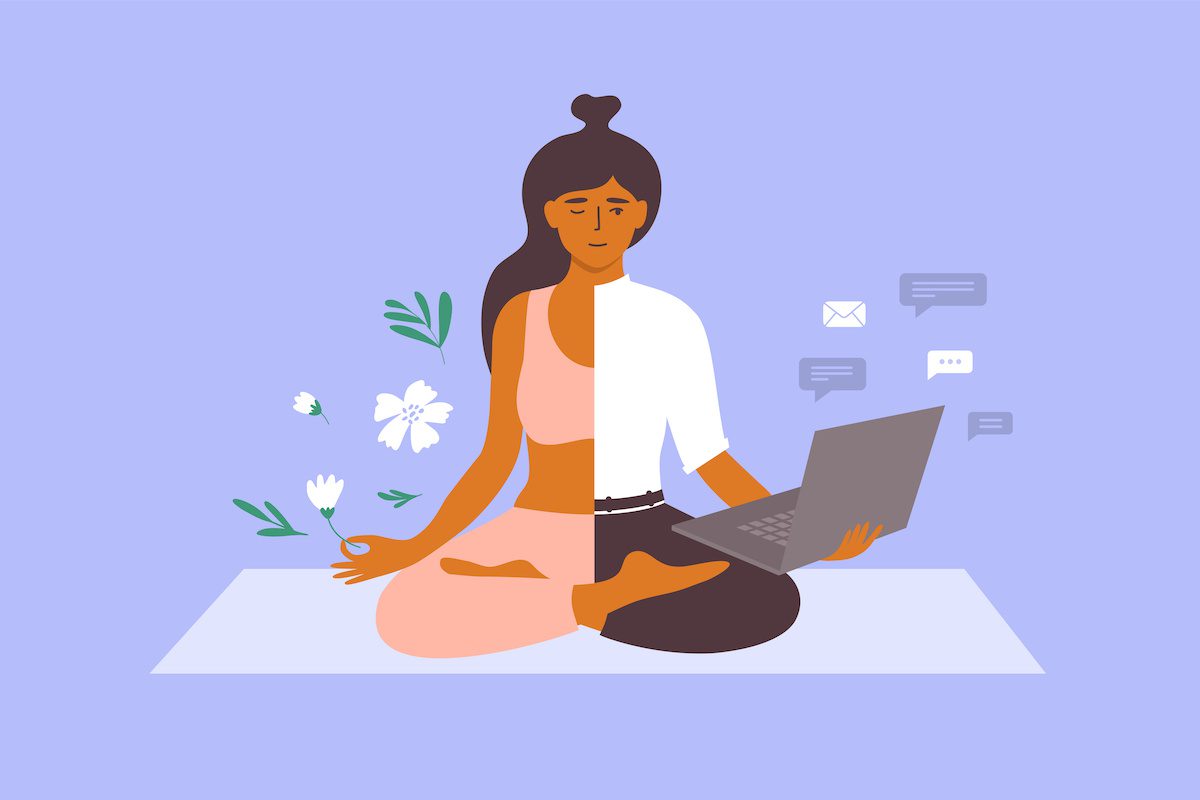Why the notion of work/life balance is a farce … and what you can do about it.
“Work hard, play hard,” the saying goes.
In truth, the notion of work/life balance on a broad scale is oxymoronic at best and utterly delusional at worst.
As much as we’d like to think we humans can do anything and everything we want in this life, we are imperfect beings, our bandwidth is limited, portions of our lives are contingent upon the vagaries of others, and work is … well, hard.
Especially for self-employed free agents — and after more than two years of the chaos and triage of life during a global pandemic — balance increasingly feels like an unattainable ideal. A growing number of experts believe a more realistic approach to feeling calm and confident about tasks revolves around priority management. In other words, the experts say, “work/life balance” is a farce.
“The reality is that there are not enough hours in the day to deliver on all the things we want, in exactly the way we imagine we can,” says Leslie Forde, founder of Mom’s Hierarchy of Needs, a virtual community that promotes self-care and mental health for modern mothers.
Yup, Moms Have It the Hardest
If anybody knows about the intersection of work and life, it’s Forde.
The mother of two has devoted her career to gaining a better understanding of how people balance personal lives with professional lives, and she has interviewed literally thousands of people over the last decade while attempting to figure things out.
In one of her most groundbreaking pieces, Forde culled input from 200 moms on the subject of mixing work and life. The takeaway: Finding balance is hard in general, and even tougher for moms.

That first piece came out before the pandemic started; obviously the shared experience of mothers changed dramatically during Covid-19. Forde recently published follow-up research that leveraged data from 2,500 different interviews to provide a look at how much our commitment to work costs us. The findings were bleak: Most of us are working too hard, stressed, and running at a deficit of self-care.
“When people rate themselves as doing well in one area, it’s always at the expense of something else,” she found. “That’s not balance. It’s struggle. And it doesn’t have to be that way.”
Of course, researchers have been looking into the notion of work/life balance for decades.
On paper, the number of hours Americans work in any given day hasn’t changed much in recent years: The most current Bureau of Labor Statistics data indicates it remained just about the same between 2019 (7.7 hours) and 2020 (7.6 hours). When added to household activities and leisure and sports, the data does seem to balance out.
(It’s worth noting that these numbers are averages and don’t take generational differences into account.)
Of course, in practice, particularly among working generations such as Millennials and Gen Xers, additional evidence suggests there is more of a gap between work-oriented activities and personal stuff. It appears the yin and yang of work and life simply cannot stay balanced for long.
Your Life WILL Get Out of Sync
A 2021 study in the Harvard Business Review investigated this phenomenon, noting that work/life balance is an ongoing cycle, not a singular achievement — something that requires constant re-evaluation.
Later that same year, author David J. McNeff wrote a whole book debunking the notion that work and life can be in balance. Fittingly, the work is titled The Work-Life Balance Myth: Rethinking Your Optimal Balance for Success.
Instead of following the roller coaster of circumstances and events in business and personal life that take people in and out of stress, the book offers a method that creates a sense of harmony. According to this method, there are seven key slices that make up your life: professional, family, personal, physical, emotional, intellectual, and spiritual. McNeff’s advice: Look at the slice in which you are least strong and come up with a practical, short activity per week that you can add to your life.
“Mathematically, we’re never going to be in balance because the two main slices demand so much – life is just designed that way,” McNeff told Forbes.
Jennifer Kelman, a licensed clinical social worker with a private practice in Boca Raton, FL, agrees.
Kelman sees several patients who wish to discuss the stress they feel when their lives are out of balance. She also happens to be a mental health and relationship expert with JustAnswer.com, a site that connects laypeople to experts who are equipped to answer pithy questions.
When asked to weigh in on the notion of balance, Kelman says she tries to get people to focus on the present, encouraging clients to surrender to the often-unpredictable demands of life, forgive themselves for getting derailed by or caught up in something stressful, and seek recovery time whenever possible.

“There’s no such thing as balance because so many of the variables change,” she says. “It’s OK to say, ‘Today was unbalanced. I didn’t get any me time. I didn’t date. I didn’t play my tennis. I hope tomorrow I can find more space for me.’”
Kelman is careful not to use the phrase “self-care,” as it’s one she loathes.
Instead, she prefers to think of prioritizing personal time as “self-soothing,” since the whole idea is to make us feel good.
“Society is all ‘push, push, push,’ and, ‘work, work, work,’ and, ‘grind, grind, grind,’ until we are needing some serious repair,” she says. “It may not be balanced, but it doesn’t have to feel lopsided and perpetually stressful, either.”
How THRIVE | Coworking Helps Restore Balance
As the Harvard Business Review has reported, achieving a healthy work/life balance is not a one-time activity. It’s an ongoing review and re-evaluation of your life and priorities.
Here’s how THRIVE can assist:
- Flexibility — With 24/7/365 access, your schedule is your schedule; fit work into your life where it fits best for you.
- Community — A hive of like-minded entrepreneurs from a wide array of industries can offer support and wisdom, along with some much-need camaraderie at one of our events.
- Purpose — Our nonprofit THRIVE | Initiative microdonation platform is a safe and easy way to make a difference with the local charity of your choice.
- Convenience — Our growing network of hybrid offices in vibrant, walkable neighborhoods can make time-consuming commutes a thing of the past.




